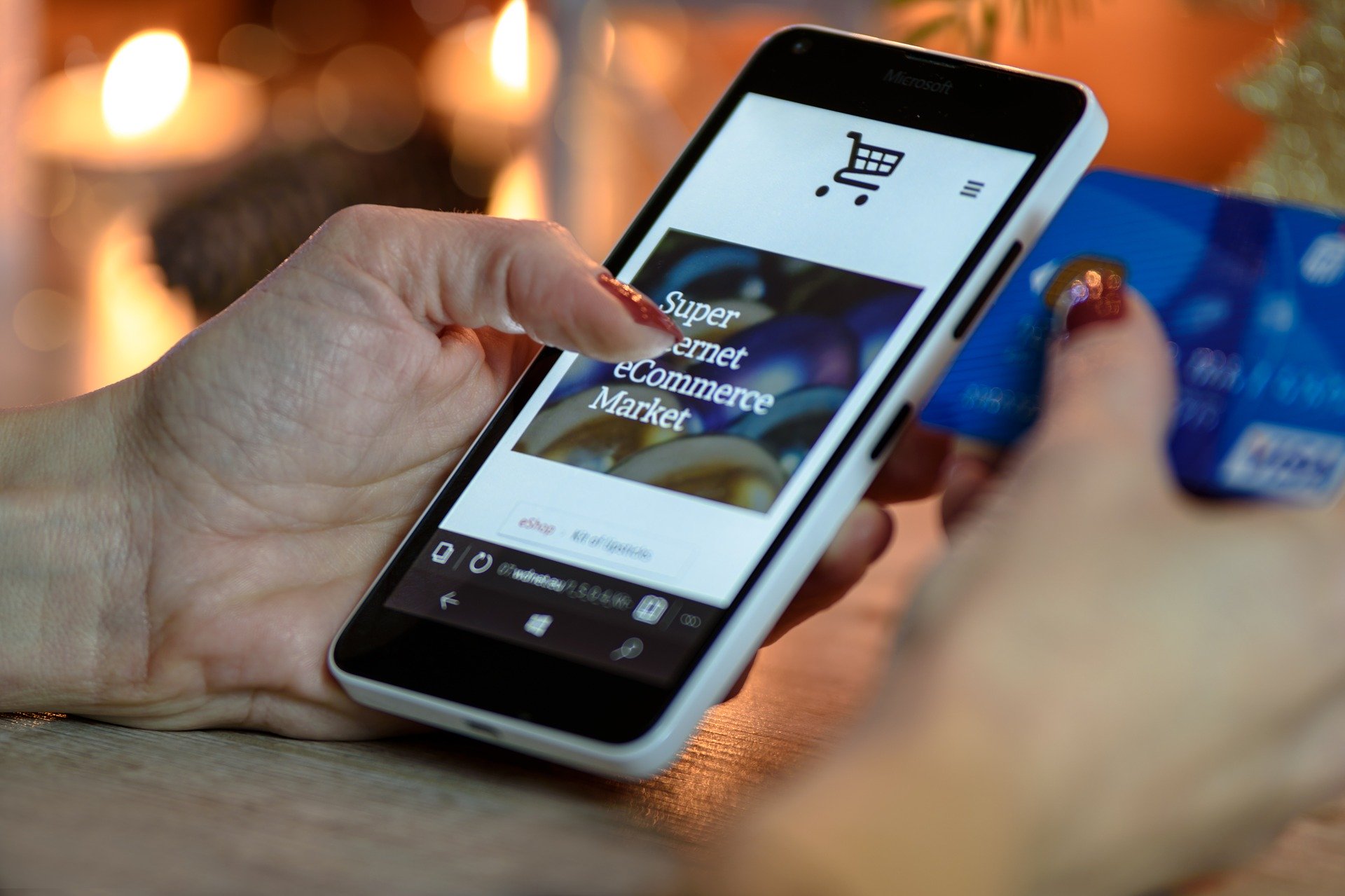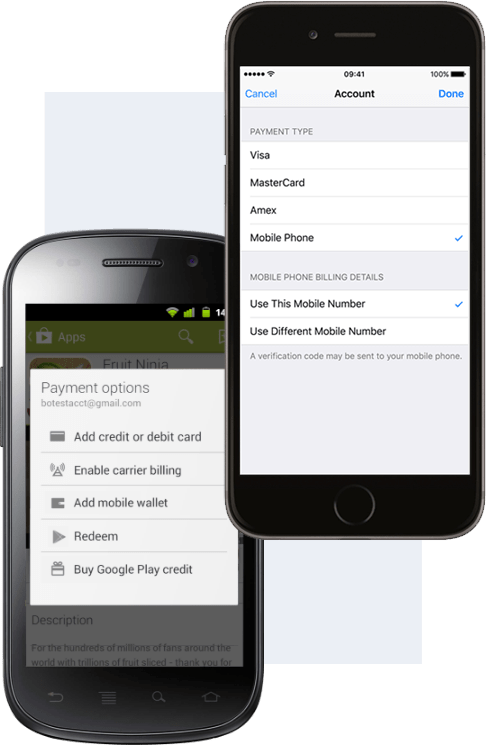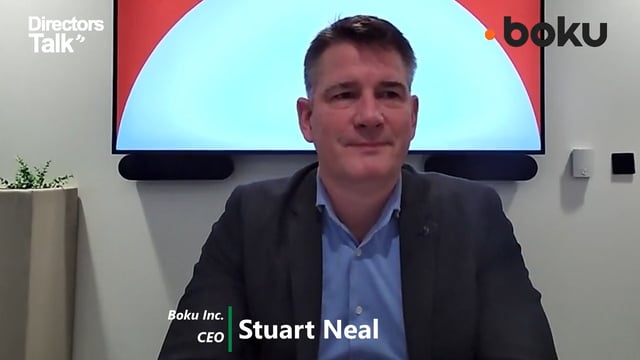Boku Inc. (LON:BOKU), a leading provider of mobile payment solutions, has announced today its audited results for the year ended 31 December 2022.
Financial Highlights
| · | Revenues up 3% to $63.8 million (2021: $62.1 million) despite significant currency headwinds. | |
| o | On a constant currency basis*, revenues were 14% higher than 2021. | |
| o | H2 2022 revenues were 21% higher than H2 2021 on a constant currency basis | |
| · | Adjusted EBITDA** of $20.5 million (2021: $22.9 million) at 32% Adjusted EBITDA margin despite currency headwinds and continued investment in Boku’s mobile-first payment network. | |
| · | Net Profit after tax of $28.9 million (2021: $6.3 million). The increase was largely due to the profit from discontinued operations after tax of $24.6m | |
| · | Net profit from continuing operations before interest and tax for 2022 was $4.5 million (2021: $10.6 million) as we incurred a fair value adjustment charge of $3.47 million in relation to Amazon warrants granted in September 2022 and impaired the carrying value of the Fortumo brand by $1.26 million | |
| · | Group cash was $116.5 million at year-end, up from $67.8 million at 30 June 2022. | |
| o | The Group is debt free. | |
| · | The average daily cash balance, a measure that smooths out the effect of carrier and merchant payments, was $98.8 million in December 2022, up from $63.3 million in June 2022. | |
| · | Cash generated from operations before working capital movements during the year was $22.0 million (2021: $19.5 million). | |
Following the disposal of Boku’s Identity division on 28 February 2022, the results shown are for the continuing Payments division. The prior year comparatives in the Consolidated Statement of Comprehensive Income have been restated accordingly and exclude the Identity division results.
Non-Financial KPIs
| · | 28% increase to 52.3 million Monthly Active Users (“MAUs”)*** in December 2022 (December 2021: 41.0 million). | |
| · | 56.7 million new users made their first payment or bundling transaction with Boku during 2022. | |
| · | TPV**** of $8.9 billion in 2022, up from $8.2 billion in 2021 despite currency headwinds. On a constant currency basis*, TPV was 20% higher than 2021. | |
| · | Particularly strong growth in the new Local Payment Methods (“LPMs”): | |
| o | 700% increase in volumes processed from LPMs including eWallets and account to account/real time payments, compared to 2021. | |
| o | 230% increase in MAUs of LPMs, to 3.8 million in December 2022 compared to 1.1 million in December 2021. | |
| o | 200% increase in new users of LPMs to 8.4 million in 2022 (2021: 2.8 million). | |
Operational Highlights
| · | New multi-year global Local Payment Method contract signed with Amazon in H2 2022. |
| · | Launched in China on Alipay and WeChat Pay wallets for global games merchant. |
| · | Approximately 150 new launches in 2022 with existing and new merchants including Google, Apple, Meta, Microsoft, Amazon, Disney, Netflix, Spotify, Samsung, Sky and EA Games, through Boku’s expanded mobile-first network. Of these launches, around 50 were for LPMs and more than 30 for bundling programmes. |
| · | Continued investment in Boku’s regulated payment capabilities which now cover more than 50 markets. |
| · | Mobile-first payments network expanded to reach over 7.7 billion end user accounts, 45% of which are non-Direct Carrier Billing (“DCB”). |
| · | Identity business sold to Twilio on 28 February 2022 for a maximum consideration of $32.5 million. |
| * | Constant currency calculated by applying the monthly average foreign exchange rates in 2021 to the actual 2022 monthly results. |
| ** | Adjusted EBITDA is defined as: Earnings before interest, tax, depreciation, amortisation, non-recurring other income, share based payment expense, foreign exchange gains/(losses) and exceptional items (see Note 8). Management has assessed this performance measure as relevant for the user of these financial statements. |
| *** | Monthly Active Users (MAU) data includes all users who successfully processed a payment or had an active bundle during the last month of the period. |
| **** | TPV (Total Payment Volume) is the US$ value of transactions processed by the Boku platform and includes transactions from DCB, Bundling, eWallets and account to account/real-time payments. More bundling programmes are included in 2022 vs. prior years as these contracts switched to an ad valorem pricing model. |
Jon Prideaux, Chief Executive of Boku Inc, commented, “2022 has been a breakout year. Boku’s growth became primarily driven not by DCB, but by mobile wallets and account-to-account/real time payments. By the end of the year, nearly 7% of our Monthly Active Users and more than double that percentage of our revenue came from these newer payment methods. Trading in January and February 2023 was strong and with new customer wins and launches, such as the new multi-year Amazon LPM contract, Boku is well set for further progress into the Big Pond.”
Boku CEO Statement
Press reviews of the financial climate in 2022 describe it as a year that the macro climate turned negative. The end of the era of cheap money. Interest rates rose as Central Banks tried to get a grip on double digit inflation; war broke out in Ukraine; food and energy prices rose in response; the continuing COVID pandemic affected supply chains in China. All the macro indicators turned negative.
Tip O’Neill the former US House Speaker said that “all politics is local”. There’s a corollary, “all company results are micro”. Despite the macro headwinds, 2022 was a transformational year for Boku.
In my last two CEO statements, I have outlined Boku’s ambition to go from the world of Direct Carrier Billing (“DCB”), into the larger market represented by general purpose, Local Payment Methods (“LPMs”) – mobile wallets account for most of the spending on the internet, exceeding even cards. Becoming a successful processor for LPMs means expanding from the multi-billion-dollar DCB market, into general ecommerce, where the value of transactions is measured in trillions – to move from being a big fish in a small pond, into the Big Pond. 2022 was the year in which this ambition became measurably closer to reality.
We started the year by completing the disposal of our Identity division to Twilio Inc. (“Twilio”) for a maximum transaction value of $32.5m, allowing us to focus our efforts on payments, and we ended it with most of our growth coming from LPMs. Along the way we announced a major new deal for LPMs with Amazon and launched with the world’s largest wallet in China, the world’s biggest video games market.
As Ella Fitzgerald sang: “This could be the start of something big”
LPMs: A fragmented market
All around Asia, the Middle East, Latin America, Africa and the Middle East, as consumers started to go online, different mobile wallets sprang up to service their needs. Collectively these new LPMs account for most online purchases worldwide, but that spending is spread over dozens of different incompatible companies. Local merchants can cope – they only have to connect to two or three brands of wallet to get the coverage that they need, but global merchants are faced with a considerable problem – to offer Local Payment Methods in all the markets where they operate they would have to make scores of different payment connections and manage many separate collections and reconciliation processes. It is essentially technically infeasible. Their problem is our opportunity: one which plays to Boku’s strengths, honed over a decade of integrating and optimising incompatible Mobile Network Operator systems.
2022 was the year in which global merchants started to accelerate their adoption of LPMs and this trend benefited Boku.
Mobile-first payment network
For many years Boku has had a big DCB network. Over the past two years we have been supplementing the DCB capability with LPMs. We’re not quite at the point of cross over but, of the 7.3 billion accounts that can be reached through the network, approximately 45% of them are now from LPMs. In 2022, Boku’s network expanded to include new methods in countries such as China, Vietnam, Pakistan, Saudi Arabia, Nigeria, Tanzania, Brazil, Egypt and Taiwan.
This network of technical connections is supplemented by a set of payment licences, partnerships and authorisations that allow Boku to provide regulated payment services in 50 countries worldwide.
In 2022, a new payment licence was granted in the Philippines and we’re in the final stages of gaining a licence in Malaysia. We received in-principle approval for an Payment Aggregator-Payment Gateway licence in India, giving us more flexibility to operate in that country. These licences are hard to get and take resources to maintain. They are essential to our business and give us the capability to connect to LPMs and move money around the world.
Volumes processed through the network were $8.9 billion, a figure affected by the strong dollar. Taking out the effect by using the average monthly exchange rates from the previous year, the increase was nearly 20%.
Focus on big merchants
Most companies are happy to work with a single payment processor. A one-stop shop to look after their payment needs and minimise the internal support cost. For them a single contract with a payment processor like Worldpay or Adyen will satisfy their needs.
But the biggest global companies, with multi-billion dollar revenues, manage their payments more actively, working with multiple providers so as to get the best quality. For them, the rewards from optimising their payment flows, even by small percentages, can be considerable.
For them, good enough coverage is not good enough. They don’t want just to see flags planted on the map showing a capability to accept, they need those implementations to deliver the best possible results.
Boku focuses its efforts on such merchants: we build customised connections to payment issuers and major merchants which deliver better results for our customers: more new users and higher sales. In 2022 we delivered nearly 150 new connections for our merchants, an increase from the prior year.
In 2022, we focused in on driving growth through LPMs for large merchants. We developed new capabilities to support both mobile wallets and Account to Account/Real Time Payments, and have implemented daily settlement. We now trade exclusively under the Boku name – discontinuing the use of Fortumo brand – and have shifted resources in our Estonian operation onto the LPMs for big merchants proposition.
Boku People
The United States motto — E Pluribus Unum: (Out of many, one) — originally represented the fact that thirteen colonies were coming together to form a single polity, it has come to represent the way that different people from different backgrounds came together to form a coherent culture. It is a noble aim and one that could also be used to represent Boku. We come from many different countries. We work in many different countries – 24 at last count. We support many different payment methods.
We are many. But we are also one.
Together Boku people work to help our customers to achieve their goals. Together we work to sell to new customers. Together we solve problems for our merchants. It is the very diversity of Boku — with people situated all around the world coming from different cultures, with different experiences and backgrounds, beliefs and orientations – that gives us our strength. Because Boku people are all around the world, we can serve our customers better. Because we come from different countries, we can understand our customers’ requirements better. And these things make us a better company. Diversity at Boku is not just some buzzword or bolt-on, dreamt up to make us look good in the Annual Report. It is who we are. It is our edge.
How do we compete in the Big Pond?
Because in LPMs we are not the big fish, we must earn our right to exist. Our competitors have more money and more people. But our people can ensure that a connection to Boku is more effective.: one of our merchants told us that by using our connection they were able to increase their ARPUs by a double digit percentage. This level of performance has meant that most of our largest customers now work with Boku on LPMs, and their deployment speeded up over the course of the year, with just over twenty connections live in H1, growing to nearly fifty by the end of the year.
What have been the results?
The job that our merchants generally hire us to do is recruit and retain users. They know that they can reach some customers using payment cards. They come to us, a Local Payment Method processor, because those new payment methods help them to recruit new users.
In December the number of active users, consumers who had at least one successful transaction or had an active bundle in the month, increased by 28% to 52.3 million, compared with December 2021
Of these, LPMs made up 3.8 million or 7.2%, this was a 230% increase over December 2021. Moreover, since LPMs are processed using the settlement model at higher than average take rates, LPMs accounted for an even greater share of revenue. An average LPM user generates more than twice as much revenue as the average DCB user.
For new users – a leading indicator of growth — LPMs took a 15% share, with 8.4 million users (up from 2.7 million in 2021) making their first ever payment on Boku using an LPM, out of a total of 56.7 million first time users across all payment methods and bundling.
Accelerating growth
Growth in the first half of 2022, was affected by comparison to the COVID boosted volumes in the first half of the previous year. As this fell out of the comparatives and the volume from new implementations, especially of Local Payment Methods started to compound, the growth in the second half of 2022 was materially stronger. On a constant currency basis**, H2 grew 21% year on year, whereas growth in the first half, on the same basis, was 8%. That acceleration was driven by launches in big markets like China, where Boku launched with a major merchant activating both Alipay, the world’s largest wallet and the second largest one, WeChatPay.
If growth is good in good times; it’s better in bad
Getting new users can be particularly important when times are tough. At the start of 2022, Netflix reported slowing subscriber numbers. But there was a bright spot: Asia. And it was in Asia that Boku was helping them to recruit new users through 27 different LPM and DCB connections. As an executive acknowledged in a Bloomberg article: “Netflix is […] attract[ing] sign-ups through innovative payment methods, like allowing users to include their subscription fees in their monthly phone bills or pay via digital wallets. […]The number of new members signing up last year using alternative payment methods more than tripled from the previous year.“
New sectors
Boku has also been able to break into new merchant verticals. The digital advertising business is nearly twice as large as the market for digital entertainment. When Boku only provided DCB, the advertising segment was unavailable to us – you’re not going to charge your advertising budget to your phone bill. But by leveraging our existing payment connection, in 2022, we have been able to grow the number of LPM payment connections to a major digital advertising platform from three in one market in 2021 to 16 in nine countries in 2022. This success gives us the credentials to sell our payment services to other digital advertising companies.
Outlook
2022 has been a breakout year. Boku’s growth became primarily driven not by DCB, but by mobile wallets and account-to-account/real time payments. By the end of the year nearly 7% of our Monthly Active Users and more than double that percentage of our revenue came from these newer payment methods. I expect both those figures to grow further in 2023. With new customer wins and launches of deals, such as the new multi-year Amazon LPM contract, Boku is well set for further progress into the Big Pond. In the immortal words of Bachman Turner Overdrive: “You ain’t seen nothing yet”.
Jon Prideaux
Chief Executive Officer
20 March 2023









































